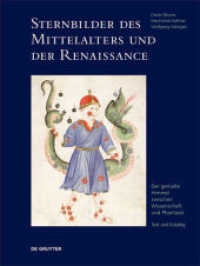- ホーム
- > 洋書
- > 英文書
- > Politics / International Relations
Full Description
This book articles presents new scholarship on the subject of imperial expansion through colonization and globalization from a variety of postcolonial perspectives. The essays in this volume, grouped in three chapters, scrutinize imperial expansion within the context of national identities and imageries-deconstructing the modernist and utopian idea of a nation as a site of homogeneity, and reviewing the importance of the concept in the different phases of colonization. Hence the first chapter is entitled 'Neo-Imperial Traces or Premonitions in Modernism.' The post-classical phase of colonialism is examined through the representation of the colonized and the once-colonized. Applying postcolonial theories and often moving beyond them, scholars scrutinize such textual and filmic representations as exemplified in Asia. These make up Chapter Two, 'Interference of the Imperial Tradition in Asia,' which allows for the re-articulations of cultural heritage in the region within the different and ever renewed schemes of imperial expansion. Chapter Three, 'Reformulations of the Imperial Project,' seeks to explore the questions surrounding inclusion in and exclusion from the realm of power as the founding principle of empire, suggesting that they are discursive and deliberate. Postcolonial societies inherit the trauma of colonialism that subjected people to a cultural displacement that is exacerbated by renewed efforts of imperial influence through globalization.
Contents
Chapter 1 The Language of Imperial Expansion Pg. vii
Part 2 I. Neo-Imperial Traces or Premonitions in Modernity
Chapter 3 Empire, the Question of Representation and the Erasure of Inhabitancy
Chapter 4 Contemporary Hollywood and the Persistence of the Empire: Nostalgia and Post-Imperial Voyeurism in Hallmark's King Solomon's Mines
Chapter 5 British Nostalgia for the Ottoman Past: The Legible Multiethnicity of Old Istanbul in the Works of Barbara Nadel and Jason Goodwin
Chapter 6 Utopian Fiction and Imperial Homogeneity: The Case of William Morris's News from Nowhere and Yussuf Sybaai's The Land of Hypocrisy
Part 7 II. Interference of the Imperial Tradition in Asia
Chapter 8 Colonizing the Mind: Education and Literacy in Colonial India
Chapter 9 Re-presenting the Empire: the Picturesque Aesthetic in 69Satyajit Ray's The Chess Players
Chapter 10 Deconstructing the Instant-Mix Imperial Democracy: Arundhati Roy's Political Essays
Chapter 11 Nuclear Imperialism: The United States and Micronesia
Part 12 III. Reformulations of the Imperial Project
Chapter 13 The Nemesis of Empire as Mimesis
Chapter 14 Empire, Allegorical Imperative, and Games of Truth: J. M. Coetzee's Waiting for the Barbarians
Chapter 15 "Child-Emporererer (Vacncy)": Apprehending U.S. Empire through Robert Fitterman's Metropolis
Chapter 16 The "Armageddon Election" and the Antichrist Debates
Chapter 17 Imperialism is on the March: Market Tyranny and the Fight Beyond Revolution








